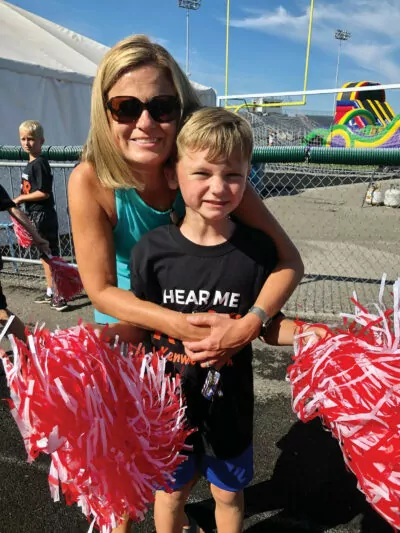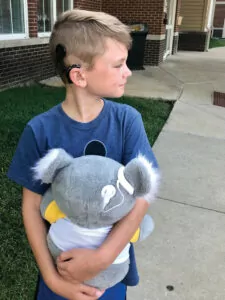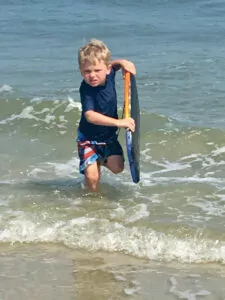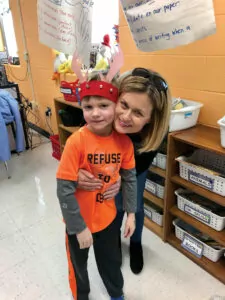
This article originally appeared in the Fall 2022 issue of On The Level.
George was only 18 months old when his mother, Andrea, started to worry. From her years working as a child therapist, Andrea could see that something was wrong with his sensory system. “He didn’t sleep, he bumped into everything, and he had balance issues,” explains Andrea.
That was the start of a vestibular journey that they are still on today, almost 8 years later.
As he grew out of infancy, George’s symptoms became more prominent. Andrea recalls one time at three years old when he was completely unable to lift his head off of his pillow. With every movement he became sick to his stomach. At the time, the nature of George’s illness was a mystery. Looking back, Andrea realizes that he was experiencing an episode of vertigo. “We had no clue, none of the doctors called it that.”
It wasn’t until George was 5 years old that Andrea started to get a picture of what her son was experiencing.
The first big breakthrough was identifying George’s hearing loss. He had lost nearly all hearing in one ear and was experiencing partial hearing loss in the other. They received the diagnosis of Enlarged Vestibular Aquaduct (EVA) and Andrea began to realize the full extent of George’s symptoms. “Probably most of his life he’s had vertigo, he just couldn’t put words to it.”
Although he had a diagnosis, George’s symptoms continued to get worse. He would go entire weeks with his whole world spinning, unable to get out of bed or keep food down. Andrea felt more and more desperate to find anyone who could help her son. But the more specialists they talked to, the more lost she felt. “You can go to 10 different doctors and get 10 different answers. I think this is the most frustrating part of all… you get a million different answers and never any solutions.”
 They thought they found the solution they were looking for in June of 2021 when George underwent surgery for a cochlear implant to address his hearing loss. However, what should have been a life-improving operation had a devastating impact on his vestibular system. After the surgery, he was in a permanent state of vertigo. Andrea’s heart was breaking, seeing her son in so much pain and unable to help.
They thought they found the solution they were looking for in June of 2021 when George underwent surgery for a cochlear implant to address his hearing loss. However, what should have been a life-improving operation had a devastating impact on his vestibular system. After the surgery, he was in a permanent state of vertigo. Andrea’s heart was breaking, seeing her son in so much pain and unable to help.
The logistics of working and caring for her son became an ongoing challenge. George missed more than 40 days of school in the months after his surgery and needed someone to stay home to care for him. They were also spending whole days traveling to the nearest specialists, just to be told over and over again that there is nothing they can do.
It was an emotional roller coaster that was taking its toll. The stress of battling chronic dizziness was made even worse for George as he was passed from provider to provider. Andrea explains “My poor child is like ‘please don’t take me to another doctor, none of them are helping me.’”
In addition to missing school and being passed from one doctor to another, George was starting to grapple with his limitations. One of his most crushing realizations happened at the beginning of this school year when he couldn’t register to play football, a sport that carries too high of a risk for someone with his condition. Not only is George disappointed that he cannot participate, but he sees that his friends are playing without him and he feels left out.
Seeing George feel excluded is one of the hardest parts for Andrea. Whether it is football practice with his friends or the bouncy house at a birthday party, she sees how badly he wants to join in. “It crushes my heart as a mom. There’s been a lot of tears over the last year, on my part and his.”
 But, as heartbreaking as it is when he experiences limitations, George never ceases to amaze his mother with how much he finds the strength to do. Despite his chronic dizziness, George remains active and involved in less risky sports. He runs around on the playground, swims, and has all of the rambunctious energy that any 9-year-old boy would. In his most recent triumph, he made it onto a competitive basketball team, showing that even with chronic dizziness he can excel as an athlete and teammate.
But, as heartbreaking as it is when he experiences limitations, George never ceases to amaze his mother with how much he finds the strength to do. Despite his chronic dizziness, George remains active and involved in less risky sports. He runs around on the playground, swims, and has all of the rambunctious energy that any 9-year-old boy would. In his most recent triumph, he made it onto a competitive basketball team, showing that even with chronic dizziness he can excel as an athlete and teammate.
Andrea is filled with pride seeing George overcome so many challenges. If there is one thing this whole journey has taught her, it is that her son cannot be stopped. “I get so worried about what the future holds for George and what his life is going to look like, but he is the most resilient, bounce-back, fight-through-this kid I’ve ever seen.”
Hope is on the horizon for an end to George’s chronic vertigo. Andrea recently found VeDA through an online support group. She reached out to the VeDA Patient Support Coordinator and received one-on-one help in her search for a specialist. After all of their searching, they finally understand what is causing his symptoms and how to fix it. George is now scheduled for another surgery, this time to repair the damage that occurred following his cochlear implant.
 The most important thing Andrea would tell another mother going through the same thing is to stay strong and keep going. “There are answers out there. You have to stay determined.”
The most important thing Andrea would tell another mother going through the same thing is to stay strong and keep going. “There are answers out there. You have to stay determined.”
